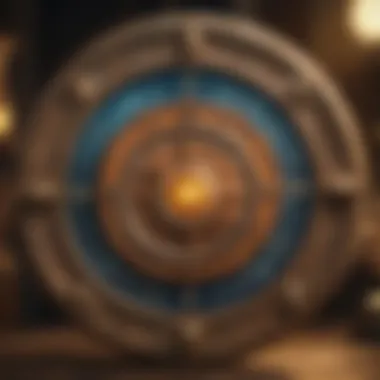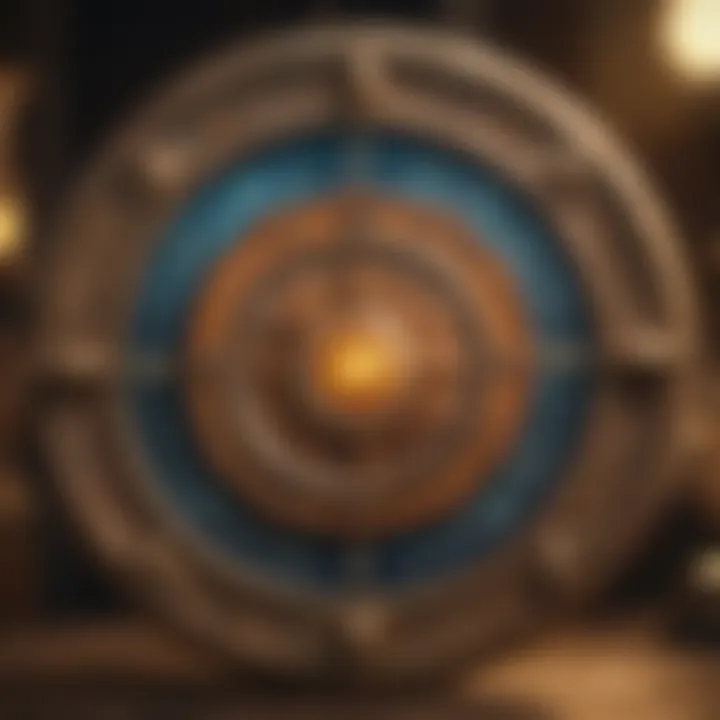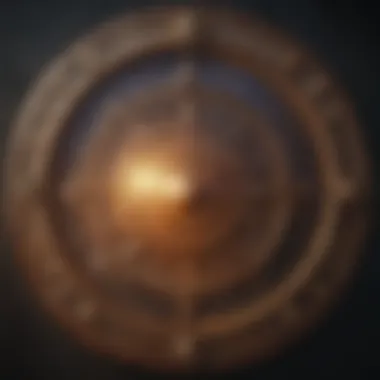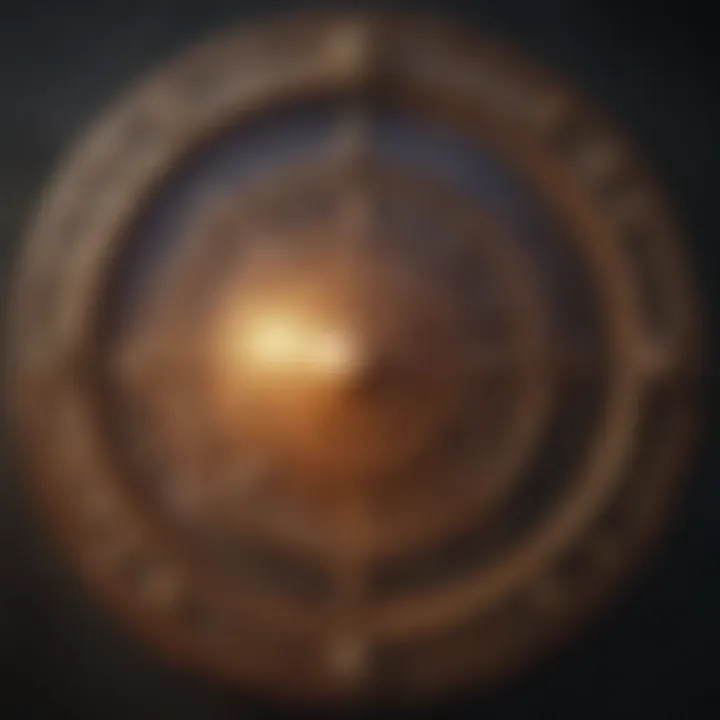Exploring Jyotish Reading: A Deep Dive into Vedic Astrology


Intro
In the vast expanse of astrological traditions, Vedic astrology, or Jyotish, stands out with its intricate tapestry of cosmic insights and wisdom. This ancient practice, steeped in over five thousand years of history, is not merely about predicting one’s future but serves as a profound tool for personal understanding and growth. Delving into Jyotish reading offers a roadmap to individuality through celestial alignments, guiding individuals in navigating the ebbs and flows of life.
As the world continues to grapple with uncertainty, the relevance of Jyotish becomes more pronounced, illuminating paths and possibilities amidst chaos. By learning the principles and methodologies inherent to this art, one can cultivate an appreciation for how celestial bodies influence personal journeys and relationships.
With that said, let’s begin our exploration of this profound discipline.
Understanding the Zodiac
Vedic astrology revolves around the twelve Zodiac signs, each embodying unique energies and traits derived from their celestial positions.
Overview of Zodiac Signs
Each sign in the Zodiac not only reflects a set of characteristics but also resonates with specific elemental vibrations and planetary influences. From Aries, the fiery pioneer, to Pisces, the ethereal dreamer, every sign plays a distinct role in shaping personality and life experiences.
Sign Traits and Characteristics
- Aries: Bold and adventurous, often taking initiative.
- Taurus: Grounded and practical, valuing stability.
- Gemini: Curious and adaptable, thriving in communication.
- Cancer: Sensitive and nurturing, deeply caring for loved ones.
- Leo: Charismatic and confident, often seeking the spotlight.
- Virgo: Detail-oriented and analytical, striving for perfection.
- Libra: Sociable and diplomatic, gravitating towards harmony.
- Scorpio: Intense and mysterious, with a penchant for deep emotional connections.
- Sagittarius: Optimistic and philosophical, always on a quest for knowledge.
- Capricorn: Ambitious and disciplined, focused on achievements.
- Aquarius: Innovative and independent, often ahead of their time.
- Pisces: Compassionate and intuitive, with a rich imagination.
Elemental Qualities
The Zodiac signs are also categorized into four elements: fire, earth, air, and water. Each element brings forth its distinctive energy:
- Fire: Aries, Leo, Sagittarius - Passionate and dynamic.
- Earth: Taurus, Virgo, Capricorn - Practical and dependable.
- Air: Gemini, Libra, Aquarius - Intellectual and communicative.
- Water: Cancer, Scorpio, Pisces - Emotional and intuitive.
Astrological Insights
Astrological insights provide a not just a snap shot of current energies but can also help in making sense of them through analysis of celestial events, thus aiding personal reflections and decisions.
Current Astrological Trends
Keeping track of the planetary movements and their meanings allows one to navigate through shifts in energy. For instance, retrograde periods invite introspection, while direct transits can signify moments of action and forward momentum.
Influence of Celestial Events
Lunar eclipses and solar eclipses often create waves in one’s life, leading to transformations or new beginnings, depending on individual charts. Understanding these cycles can prepare readers for significant changes.
How to Interpret Your Birth Chart
A birth chart serves as a snapshot of the cosmos at the moment of one’s birth. Every individual’s chart tells a story, where the positions of the planets relate to personal attributes and life progressions. To interpret it:
- Locate your sun, moon, and rising signs.
- Understand the houses where different planets reside.
- Analyze the angles between planets for deeper insights.
Horoscope and Predictions
Creating personalized horoscopes extends the understanding of one’s character and potential future trends.
Monthly or Weekly Forecasts
Reviewing current astrological influences can offer guidance on the best timings for actions and decisions.
Personalized Horoscope Reading
An in-depth reading provides tailored insights based on the individual’s unique celestial map, fostering self-awareness and strategic planning.
Compatibility Readings based on Zodiac signs
Understanding compatibility between Zodiac signs can facilitate healthier relationships. For example, a Taurus may find grounding with a Virgo, while a Sagittarius might thrive in adventures alongside an Aquarius.
"Astrology is the study of cycles; it's understanding how time reflects through our lives."
By navigating the complexities woven throughout Jyotish, one can not only enjoy peace in the present but also embrace the potential that lies ahead, playing into the cosmic rhythm of existence.
Understanding Jyotish


Understanding Jyotish is crucial for grasping the intricate mechanisms of Vedic astrology. It lays the foundation for how individuals can interpret the celestial influences in their lives. This section dives into the essence of Jyotish—what it encompasses, why it matters, and the various layers of complexity that invite both novice and seasoned astrologers alike.
At its core, Jyotish is not just a tool for divination but a science that intertwines spirituality and practicality. The benefits come in various forms, such as personal growth, decision-making guidance, and a deeper connection to one’s life path. When one engages with Jyotish, it opens up a realm of introspection and clarity, allowing individuals to align their actions with the cosmic flow. This reflection helps to avoid common pitfalls of life, providing insights that are as relevant today as they were thousands of years ago.
The Origins of Jyotish
Jyotish, or Vedic astrology, has roots that can be traced back over 5,000 years in Indian history. Hailing from ancient scriptures called the Vedas, it represents a sophisticated understanding of astronomy and divinity. The word "Jyotish" itself arises from the Sanskrit root "jyoti," meaning light, indicating that this field aims to shed light on human existence through celestial observations.
Numerous scholars have contributed to its development, each adding layers of understanding. The sages of yore were instrumental in creating a framework that is both scientific and mystical. Through rigorous observation of the cosmos, they established calculations for planetary movements and their corresponding effects on life here on Earth.
In summary, the historical tapestry of Jyotish is rich and complex; it includes philosophies and practices that have been refined through generations. Its origins remind practitioners of their roots and offer a sense of continuity in an ever-changing world.
Core Concepts of Vedic Astrology
Delving into the core concepts of Vedic astrology reveals its profound depth. The foundation rests upon several essential elements:
- Rashis (Zodiac Signs): Comprised of twelve signs, each represents specific traits and energies. Understanding these helps in building the character and essence of a person.
- Nakshatras (Lunar Mansions): There are twenty-seven Nakshatras that play a pivotal role in Vedic astrology. They influence emotional traits, spirituality, and even karmic paths.
- Bhavas (Houses): The astrological houses map different life areas, such as personal relationships, career, and spirituality. They indicate where energies manifest in a person's life.
- Grahas (Planets): Each planet has unique attributes and influences. For instance, Venus might bring love and creativity, while Saturn often teaches discipline through challenges.
These concepts blend together to form a cohesive framework. This framework allows astrologers to interpret complex overlays of cosmic energy, providing insight into individual life paths. Grasping these concepts is essential for anyone looking to deepen their astrological practice, offering both a lens through which to view life and a compass for navigating its complexities.
The Role of Celestial Bodies
Celestial bodies are not merely distant entities; they represent dynamic forces that shape our reality. In Jyotish, planets, stars, and celestial phenomena correlate closely with human experiences. To put it simply, the movements of these bodies correlate with rhythms that resonate profoundly within individuals.
Imagine a moment when the moon is known to be in a sign that emphasizes renewal. Many practitioners view this as an opportune time for personal reflection and goal-setting. The sun, on the other hand, symbolizes vitality and authority, influencing ambitions and personal power.
The awareness of these bodies is integral in Jyotish for making predictions and providing guidance. Astrologers observe planetary alignments and transits to understand both current and future influences. Their positions can signify fortune, trials, or transformation.
This understanding extends beyond routine astrology; it's a recognition of our connection to a broader universe. Through the lens of celestial bodies, one can appreciate the intricate dance between cosmic forces and individual lives.
The Importance of Birth Charts
A birth chart, also known as a Kundali or natal chart, is a cosmic snapshot of where the celestial bodies were positioned at the exact time of a person's birth. This chart serves as the backbone of Jyotish, intertwining the delicate balances of time, space, and individual destiny. Understanding the importance of birth charts emphasizes not only their astrological significance but also their role in shaping personal insights and life paths.
A birth chart is akin to a personalized map of one’s cosmological influence. Each planet and star functions like a puzzle piece that contributes to the complexity of a person’s life story. With respect to Jyotish reading, the birth chart is critical for several reasons:
- Personal Insights: It reveals innate strengths and weaknesses, guiding individuals on their personal journeys.
- Predictive Framework: Astrologers use it as a reference point for making predictions about future trends in a person’s life.
- Timing of Events: The chart helps in determining auspicious times for significant decisions or actions in life.
In essence, the birth chart is not just a passive reflection of cosmic positions; it actively serves as a guiding light, shaping opportunities and challenges that an individual may encounter.
Interpreting the Kundali
Interpreting the Kundali is about weaving together various elements to create a cohesive narrative. An astrologer delves into the details, examining the sun, moon, and rising signs, among other components. Each segment of the chart contributes unique characteristics that feed into the whole. The sun sign offers insights into core identity, while the moon represents emotions and subconscious inclinations. The rising sign reveals how the individual presents themselves to the world.
Consider this: if the sun sits in Aries, you’re likely to display traits of assertiveness and confidence. Conversely, a moon in Cancer may suggest a tendency toward emotional sensitivity and protective instincts. It becomes a complex blend—a layered understanding of a person that provides valuable insights.
Planetary Positions and Their Meaning
Next, we focus on planetary positions. Each planet embodies distinct qualities, and their placements across the twelve houses represents various aspects of life—relationships, career, home, and more. For instance, if Venus is positioned in the 7th house, it could indicate a strong focus on partnerships, possibly suggesting harmonious relationships.
Every interaction between the planets is essential in Jyotish reading. Their angular relationships, known as aspects, further deepen the interpretation. A challenging aspect, like a square between Mars and Saturn, might point toward inner conflict or difficulty, while a harmonious trine can signify ease and opportunity. Thus, understanding the meaning behind planetary positions is crucial for accurate predictions and personal assessments.
The Influence of Houses
The twelve houses in a birth chart represent vast areas of human experience and condition. Each house holds meaning, and planets residing within them give clarity to those areas. For instance, the 2nd house relates to personal finances and possessions. A strong Jupiter here could signify prosperity and wealth accumulation, while a problematic Saturn might indicate financial struggles that require discipline.
The houses also reflect life stages, presenting a timeline of experiences and lessons. If one's 10th house—representing career—captures a prominent aspect from a strong planet, it often points to a marked success or notable public recognition.
The impact of the houses is dynamically rich, blending with planetary influences to cultivate an intricate picture of the individual. Thus, they play a significant role in Jyotish reading, providing invaluable insights into personal circumstances and trajectories.
In the realm of Vedic astrology, understanding the birth chart not only illuminates the individual’s path but acts as a whisper of the universe's intentions.
Key Techniques in Jyotish Reading
When one delves into jyotish reading, it becomes clear that the finesse of this ancient art relies heavily on a few key techniques. These methods serve as the backbone of Vedic astrology, allowing practitioners to dissect complex client needs and tailor their interpretations accordingly. Each technique holds a unique significance, providing insights into the right timing for events, the influence of planetary movements, and the resolution of inherent challenges. Understanding these facets can be the difference between a mere reading and a transformative experience for both practitioner and client.
Dashas: Timing of Events


One of the cornerstone techniques in Vedic astrology is the Dasha system, which focuses primarily on timing. Dashas are planetary periods that signify different phases in a person’s life, each governed by a specific planet. These periods are much like chapters in a book, dedicating time to various narratives shaped by planetary alignments.
For example, during a Mars Dasha, an individual might find themselves facing increased energy and drive, possibly leading to a new venture or a challenge that demands assertiveness. Such moments can be pivotal, making it essential for astrologers to not just know when a Dasha occurs, but also to interpret its implications thoughtfully.
"The Dasha system is the clock of life, marking significant milestones and shifts that define the journey of each soul."
Transits and Their Implications
Transits serve as a dynamic counterpart to Dashas, offering real-time insights into how the movement of planets influences an individual’s life. Simply put, while Dashas indicate long-term trends, transits reflect shorter-lived influences that can create ripples in one’s daily routine.
Astrologers look at the current positioning of planets as they interact with the birth chart—this analysis helps in predicting events or moods at any given time. For instance, a Saturn transit may bring about feelings of restraint or responsibility, urging one to embark on a serious project. Recognizing these patterns allows practitioners to guide clients through turbulent times, emphasizing the need to adapt to celestial rhythms.
Harmonizing Doshas
The term ‘Dosha’ might be more familiar to those versed in Ayurveda, yet it finds its significance in Jyotish as well. In this context, Doshas can refer to imbalances or obstacles presented in a natal chart. A common goal among astrologers is harmonizing these Doshas, which involves identifying which planetary influences cause difficulties and providing remedies.
Astrologers may advise on various strategies, such as wearing specific gemstones, performing rituals or chanting mantras, all in an effort to balance these planetary energies. By embracing such practices, clients often find a path not only towards resolution but also personal growth. Additionally, recognizing issues presented by Doshas contributes to a greater sense of self-awareness, aligning individuals closer to their true potential.
Understanding these techniques—the timing through Dashas, the ebb and flow of transits, and the pursuit of harmony via Doshas—provides deep insights not just into predictions but into the greater currents of life we all navigate. The skilled Jyotish reader wields these tools with artfulness, shaping pathways that connect the cosmos with everyday existence.
Practical Applications of Jyotish
Jyotish, an ancient system rooted in Vedic astrology, offers a profound toolkit for navigating the complexities of modern life. The practical applications of Jyotish extend beyond mere predictions; they become a guiding light for personal development, relationships, and careers. In a world bustling with uncertainty, understanding how to harness Jyotish principles can truly empower individuals to take charge of their pathways.
Personal Development through Jyotish
The journey of self-discovery is often labyrinthine, yet Jyotish serves as a reliable map. By diving deep into one's birth chart, individuals can unearth not only their strengths but also areas where growth is needed. For instance, individuals with a strong Mars placement may find they are instinctively bold but could benefit from cultivating patience and introspection.
- Identifying Strengths and Weaknesses: Understanding the positions of various planets can illuminate personal traits. Mercury in a favorable position suggests quick thinking, while its challenges might indicate misunderstandings in communication.
- Setting Personal Goals: Armed with insights from Jyotish, one can set realistic goals aligned with their cosmic blueprint.
- Enhancing Inner Awareness: Practicing self-reflection based on astrological guidance allows individuals to cultivate mindfulness, making personal growth more structured.
Navigation of Relationships
In the tapestry of life, relationships often form the most intricate patterns. Jyotish can play a pivotal role in understanding dynamics between individuals, be it in friendships, familial bonds, or romantic partnerships. The synastry analysis sheds light onto compatibility aspects, further enriching these connections.
- Understanding Compatibility: Each person carries their own planetary influences which interact in unique ways. Analyzing these factors can reveal if two people are aligned or if certain clashes are inevitable.
- Conflict Resolution: Jyotish provides tools for tackling disputes. If Saturn is prominently placed in a person's chart, they might approach situations with a sense of seriousness that requires a partner's light-heartedness to balance.
- Fostering Healthy Communication: With knowledge of one's Venus placement, one can become more astute in nurturing relationships, offering affection in ways that resonate most with their loved ones.
Deciphering Career Paths
When it comes to career choices, Jyotish can serve as a compass guiding one towards professions that spark fulfillment and success. By assessing the tenth house in a birth chart, individuals can uncover their vocational calling.
- Vocational Insights: Different planetary influences can suggest the most suitable careers. For example, those with a strong Jupiter might find fulfillment in teaching or philosophy, while Avocations related to arts may suit a well-placed Venus.
- Timing for Career Moves: Dashas or planetary periods indicate the best times for career changes or launching new ventures. A Rahu Dasha could signify a time to explore unconventional fields, while a Sun Dasha may enhance leadership roles.
- Challenges in the Professional Sphere: Knowing one's chart allows for preemptive navigation through possible career pitfalls. Understanding potential Saturn influences might prompt caution in decision-making processes.
Common Misconceptions in Jyotish Reading
Understanding Jyotish reading involves dissecting numerous ideas that can often be misleading or overly simplistic. These misconceptions can cloud the practice, leading to misinterpretations and a lack of appreciation for the depth and wisdom embedded in Vedic astrology. It is crucial for practitioners—not just the astrologers but also the seekers of knowledge—to navigate through the fog of misbeliefs. By doing so, they can deepen their comprehension and experience of Jyotish, allowing a more authentic connection with its teachings.
Distinguishing Fact from Fiction
One of the most common misconceptions is the belief that Jyotish offers rigid, predetermined outcomes. The idea that a Jyotish reading provides a straightforward, black-and-white prediction is not only misleading but also hampers understanding.
Astrology can provide insights based on the positions of celestial bodies at the time of one’s birth, yet it does not chainsaw off free will. Life is, after all, influenced by various factors beyond astrological alignments.
- Subjective Nature: Different practitioners may interpret the same birth chart differently, which underscores the subjective and nuanced nature of astrologic work. Not every reading will yield the same interpretation, much like how different chefs will produce unique flavors even with the same recipe.
- Dynamic Influence: The planetary positions change regularly. Thus, Jyotish does not operate in a vacuum. It intertwines continually with an individual’s choices and circumstances, shaping a dance of predictability and unpredictability.
Given these points, practitioners must clarify their role in helping clients navigate their chart rather than dictate their fate. This distinction is vital for building a relationship based on trust and understanding.
Understanding Predictive Limitations
The allure of predictive astrology often comes with inflated expectations. It’s essential to recognize its boundaries. A common fallacy is that Jyotish guarantees specific outcomes—such as wealth, love, or success—at certain periods of life. However, the reality is far more intricate.
- Qualitative Insights: Jyotish provides qualitative insights rather than quantitative predictions. Think of it like a weather forecast: it can tell you when conditions might be ripe for change but cannot assure you that it will rain or sunshine on that day. The broader context matters immensely.
- Timing and Influence: Just because a planetary transit indicates challenges does not mean you will inevitably face them. Your individual responses and decisions play a pivotal role in how these influences manifest.
As practitioners of Jyotish, it is essential to communicate these limitations upfront. Clients should feel empowered to discern their paths while using these astrological insights as guiding lights rather than shackles.
"Astrology does not control our destinies, but rather, it provides a roadmap, rich with twists and turns, helping us navigate through our experiences."
Cultural Significance of Jyotish


The relevance of Jyotish, or Vedic astrology, extends beyond mere predictions and interpretations of celestial positions. It plays a significant role in various cultural contexts, particularly within the Indian traditions where it originated. Understanding its cultural significance involves recognizing the intersection of spirituality, personal destiny, and societal norms. This ancient knowledge has not only shaped individual lives but has also been intricately woven into the fabric of community life, rituals, and decision-making processes.
Jyotish in Indian Traditions
In India, Jyotish is more than a tool for divination; it is a respected science that has been embraced for millennia. Traditional weddings often view horoscopes as critical to assessing compatibility between partners. Families consult astrologers to determine auspicious dates for significant events, such as births, marriages, or housewarmings. The influence of Jyotish can also be seen in festivals and religious observances, where planetary positions can dictate the timing and nature of celebrations.
One of the most revered texts, the "Brihat Parashara Hora Shastra," lays out the foundational principles of Jyotish, blending astronomical observations with spiritual philosophies. This text serves as a cornerstone for countless practitioners, emphasizing the astrological impacts on both personal lives and broader societal aspects.
"Jyotish is the light of the heavens, guiding us through the shadows of earthly existence."
This cultural significance is reflective of a broader philosophical belief in karma and dharma, where every action is seen as having consequences deeply rooted in one's birth circumstances as depicted in the natal chart. Moreover, Jyotish is often regarded as a way to achieve a higher understanding of one's self and to navigate life's complexities with greater awareness.
Global Influence of Vedic Astrology
As the world shrinks and cultures intertwine, the principles of Vedic astrology are finding their place outside of India. Many Western practitioners have begun to integrate these age-old teachings into their own astrological practices, blending Eastern and Western astrological insights. This cross-cultural exchange has birthed myriad interpretations and applications in personal life, therapy, and even corporate decision-making.
The recognition of Jyotish outside its traditional borders raises questions about its adaptability and relevance. It's essential to consider how its core philosophies resonate with universal quests for knowledge, self-awareness, and improvement. Key elements of Jyotish, such as the analysis of the moon sign, planetary transits, and the concept of dashas, have attracted those seeking holistic approaches to personal challenges and life purposes.
Furthermore, online communities, especially on platforms such as Reddit and Facebook, foster discussions and share interpretations rooted in Jyotish principles, illustrating the growing interest in its applications globally. Again, this isn't merely a passing trend; it's indicative of a larger cultural shift towards incorporating diverse spiritual practices into daily living.
In summary, the cultural significance of Jyotish is multifaceted, bridging ancient traditions and modern practices. Its impact is felt not just in India but around the world, influencing how individuals view their place in the cosmos and their destiny in life.
The Future of Jyotish Reading
The future of jyotish reading is a topic that carries significant weight in both the realms of traditional practices and modern applications. As the world evolves, so does the practice of Vedic astrology, beckoning a new era where ancient wisdom meets contemporary insights. This section dives into the potential that lies ahead for jyotish, exploring how it can adapt and thrive amidst changing societal values and emerging technologies. A key element to consider is the relationship between jyotish and modern scientific paradigms.
Integration with Modern Science
With the rise of technology and a growing interest in data analytics, there has been a push to reconcile the insights provided by jyotish with scientific reasoning. Many practitioners argue that bridging these two domains can enhance the credibility and acceptance of Vedic astrology. Integrating empirical research and psychological insights into jyotish practices can foster deeper understanding. It seems that many of today's astrologers are beginning to look to the latest findings in psychology to better interpret astrological data and chart readings.
In recent years, some studies have suggested correlations between planetary positions and human behavior, though skeptics remain.
- Potential Benefits of Interdisciplinary Collaboration:
- Enhances the framework and accuracy of predictive models.
- Validates jyotish in a scientific context, potentially drawing in a more extensive audience.
- Promotes mental well-being and self-discovery through psychological practices aligned with astrological insights.
However, this integrating approach requires caution. While understanding planetary influences through the lens of science can be promising, there is a delicate balance to strike. The essence of jyotish lies not just in the methodology but also in the spiritual narrative that encapsulates human existence.
"There are more things in heaven and earth, Horatio, than are dreamt of in your philosophy."
Evolving Practices in a Digital Age
The influence of the digital revolution on jyotish cannot be understated. The modern age has opened doors to online consultations, social media discourse, and widespread accessibility of astrological content. Quite a handful of knowledgeable practitioners now share insights through webinars, podcasts, and articles, bypassing traditional pathways. This evolution isn’t limited just to accessibility; it extends to how jyotish is practiced.
In the digital context, several notable shifts are occurring:
- Expansion of Platforms:
- Tailored Personalization:
- Global Reach and Cultural Exchange:
- Astrologers are exploring new technologies, using algorithms and apps to generate birth charts and predictions.
- The rise of online communities allows for information exchange, debate, and learning.
- AI-driven tools are offering customized jyotish readings based on individual data inputs.
- Personal growth applications integrating jyotish principles for self-discovery are increasingly popular.
- Jyotish practices are encountering influences from other astrological systems worldwide, leading to richer interpretations.
Every shift comes with its own set of considerations. While the technologies can usher in new audiences and methodologies, there remains a challenge in maintaining the authenticity and depth that jyotish embodies. Engaging a modern audience requires a commitment to honoring the tradition while being open to new interpretations and practices.
As we look to the future, it’s clear that jyotish’s relevance will not wane. Instead, it will transform, reflecting the needs and knowledge of a new age while preserving its rich heritage.
Ethics and Responsibility in Jyotish Practice
The realm of Jyotish is not just a path to insight and guidance; it’s also a field laden with ethical considerations. As astrology practitioners, navigating the intricate lines between advice, interpretation, and personal boundaries becomes pivotal. Ethics in Jyotish are essential to ensure credibility and respect in what many consider sacred wisdom. These ethical guidelines are not merely suggestions but necessary frameworks that uphold the dignity and integrity of this ancient practice.
When we speak of ethics in Jyotish, it entails a commitment to responsible practice. This means that both practitioners and clients must engage with the readings as a form of support, rather than definitive forecasts of fate. Understanding that predictions hold a certain fluidity, shaped by individual choices, is crucial. It fosters a collaborative atmosphere, encouraging clients to see jyotish not just as a predictive tool but as a means to empower personal growth.
Practitioner accountability forms the backbone of ethical practice in Jyotish. Astrologers must own their interpretations and the impact they can have on their clients’ lives. This involves a clear understanding of the tools and methods at one’s disposal, ensuring readings are grounded in a solid foundation of knowledge rather than guesswork or whims. Upholding this standard builds trust and integrity, essential ingredients for any lasting relationship.
Another significant aspect of ethics pertains to the client's awareness and education. Informing clients about the nature of jyotish, the limitations of predictions, and the possibility of varying outcomes fosters a more informed clientele. Rather than creating dependency, an ethical practice encourages clients to take active roles in their journeys. This approach not only nurtures trust but also enriches the experience of both parties.
"Ethical practice in Jyotish is not only about what you read in the stars; it is about how you navigate the human experience that comes along with it."
A thoughtful practitioner will strive to establish comprehensive educational resources and communication strategies to help clients better understand their readings. This might include timely follow-ups or workshops that delve deeper into concepts ranging from planetary influences to the significance of their birth charts. The goal here is to demystify the practice and ensure clients leave each session with clarity and confidence.*
In summary, the ethics and responsibility within Jyotish practice require an intricate balancing act. Upholding high standards in practitioner accountability alongside client awareness creates a transparent and enriching environment. This helps to ensure not just the growth of clients but the vitality of the practice itself, creating an ecosystem where wisdom meets responsibility.







